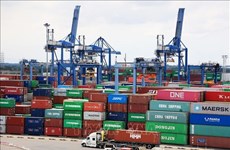Trade disputes up alongside economic integration
Together with the increase in trade activities given the country’s
international economic integration, trade disputes between Vietnam and
importing countries are also rising, according to the Vietnam Chamber of
Commerce and Industry (VCCI).
Together with the increase in trade activities given the country’s
international economic integration, trade disputes between Vietnam and
importing countries are also rising, according to the Vietnam Chamber of
Commerce and Industry (VCCI).
The Can Tho branch of the VCCI announced last week in a report quoted by the Saigon Times Daily that trade disputes among Vietnamese exporting enterprises and other nations have picked up in terms of case numbers and commodities since 2010.
Local exporters faced two anti-dumping lawsuits and one anti-subsidy case in 2010, four anti-dumping lawsuits and two anti-subsidy cases in 2011, according to the report.
Exports facing trade disputes in 2010 were hangers, air conditioners and polyethylene (PE) plastic bags, which increased to five in 2011 with rolled steel, yarn, footwear, steel pipes and carbon steel pipes.
The Vietnam Competition Authority under the Ministry of Industry and Trade said in its Annual Report 2012 that it handled 12 trade remedy cases against Vietnam exports, including seven anti-dumping cases, one anti-circumvention case, two countervailing duties cases and two protection cases.
Similarly, exporting firms have been charged with four anti-subsidy lawsuits and three anti-dumping ones this year. Four items suffering the charges from January to May this year are steel conduit pipes, stainless steel pipes, stainless steel and frozen warm water shrimp.
Nguyen Phuong Lam, director of the Legal Compliance Department of Can Tho branch’s VCCI, recently cited statistics on trade disputes handled at the Vietnam International Arbitration Centre (VIAC) showing commodity trading disputes posting the highest ratio, at over 70percent , followed by processing and construction sharing 5 percent each. Investment cooperation disputes alone make up 4 percent of the case number settled by VIAC, reported the Saigon Times Daily.
According to Lam, experiences from trade disputes expose the two main weak points of exporting enterprises - the lack of information on customers and importing nations, and the poor knowledge of related laws.
"Studying customers is a very important factor but local exporters often forget to do so, with up to 80 percent of local firms failing to invest in this step," he said at a seminar on solutions for farm produce and seafood exports held in Can Tho City last week.
He also advised enterprises to pay attention to how and where the problems will be handled when signing export contracts. In particular, local firms need to master trade dispute law and international law or buy insurance to avoid risks in case of disputes./.
The Can Tho branch of the VCCI announced last week in a report quoted by the Saigon Times Daily that trade disputes among Vietnamese exporting enterprises and other nations have picked up in terms of case numbers and commodities since 2010.
Local exporters faced two anti-dumping lawsuits and one anti-subsidy case in 2010, four anti-dumping lawsuits and two anti-subsidy cases in 2011, according to the report.
Exports facing trade disputes in 2010 were hangers, air conditioners and polyethylene (PE) plastic bags, which increased to five in 2011 with rolled steel, yarn, footwear, steel pipes and carbon steel pipes.
The Vietnam Competition Authority under the Ministry of Industry and Trade said in its Annual Report 2012 that it handled 12 trade remedy cases against Vietnam exports, including seven anti-dumping cases, one anti-circumvention case, two countervailing duties cases and two protection cases.
Similarly, exporting firms have been charged with four anti-subsidy lawsuits and three anti-dumping ones this year. Four items suffering the charges from January to May this year are steel conduit pipes, stainless steel pipes, stainless steel and frozen warm water shrimp.
Nguyen Phuong Lam, director of the Legal Compliance Department of Can Tho branch’s VCCI, recently cited statistics on trade disputes handled at the Vietnam International Arbitration Centre (VIAC) showing commodity trading disputes posting the highest ratio, at over 70percent , followed by processing and construction sharing 5 percent each. Investment cooperation disputes alone make up 4 percent of the case number settled by VIAC, reported the Saigon Times Daily.
According to Lam, experiences from trade disputes expose the two main weak points of exporting enterprises - the lack of information on customers and importing nations, and the poor knowledge of related laws.
"Studying customers is a very important factor but local exporters often forget to do so, with up to 80 percent of local firms failing to invest in this step," he said at a seminar on solutions for farm produce and seafood exports held in Can Tho City last week.
He also advised enterprises to pay attention to how and where the problems will be handled when signing export contracts. In particular, local firms need to master trade dispute law and international law or buy insurance to avoid risks in case of disputes./.













